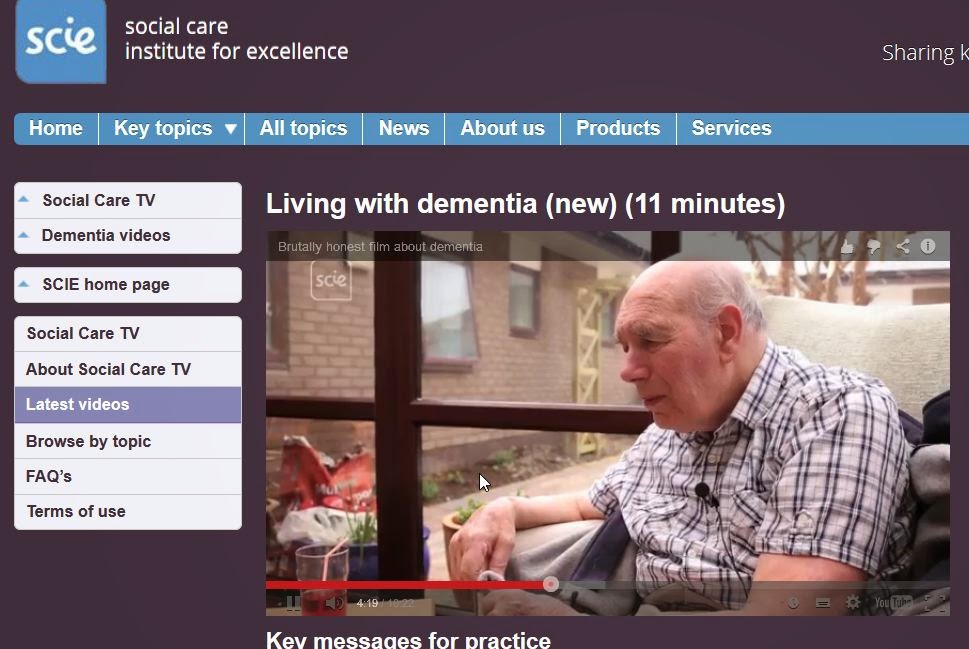A 'Quality Standard' aimed at social care services, and particularly care homes, published in 2013, focused on older people's mental well-being in care homes. If you're familiar with these things, you'll know that quality standards are a list of things that services should be achieving, published by the NICE (the National Institute for Clinical Excellence), which researches the best standards which services and professionals are encouraged to pick up on. There are six statements in this one:
1 Older people in care homes are offered opportunities during their day
to participate in meaningful activity that promotes their health and
mental wellbeing.
2 Older people in care homes are enabled to maintain and develop their personal identity.
3 Older people in care homes have the symptoms and signs of mental health
conditions recognised and recorded as part of their care plan.
4 Older people in care homes who have specific needs arising from sensory
impairment have these recognised and recorded as part of their care
plan.
5 Older people in care homes have the symptoms and signs of physical
problems recognised and recorded as part of their care plan.
6 Older people in care homes have access to the full range of healthcare services when they need them.
Link to the guidance for care homes.
It's good to see this sort of thing being done: older people should be able to feel good, and keep their minds in trim; basic care that only permits existence rather than personal development is just not good enough.If a care home is doing this stuff, their residents should not be sitting round (or marooned in their own room) watching telly. Instead they should have the chance to take part in useful and interesting activities, which means much more than periodic sessions of bingo. I was disappointed to see in the film that accompanies the publicity about the publication of the standards that a bingo session was used to illustrate activities; bingo requires quite a large audience to be interesting and this means that lots of people get dragooned into it, and don't get their minds stretched by a variety of arts, sports, or creative activities.
The standards come about because a lot of research says that older people are depressed, lonely and unstimulated in care homes and in their own homes if they receive care there because they are frail. Because they are receiving care services because they are unable to manage their own lives fully, they also don't get the kind of detailed attention to their routine healthcare needs, such as dental, hearing, sight and podiatry services that would make those lives more comfortable.
There is a film about the quality standard (see the illustration in this post), but although the principles are well-expressed, it officialdom in video: it starts by telling you how wonderful it is that NICE has done this and how the inspectors are going to use the standards, but mostly has people wittering on at a conference to promote the standard to people in the field. This was held in the wood-panelled splendour of the place where the Chelsea Pensioners live, and they took part in their scarlet and bemedalled uniforms, telling the participants about their experience of older people's services. But most of the film is preachy platitudes from senior people in social and health care, so the whole thing is not incisive or practically helpful either for people trying to operate the services or trying to improve them as residents. An opportunity missed in a rather expensive way.
Link to the film.
More useful for professionals are the resources intended to support services trying to do something about it: they cover research studies on issues on mental well-being of older people in care and more information on what you can do about it. Print wins our again: you really have to be very thoughtful about what your audience is for a video: it takes time to watch a video, and you can't skip the boring stuff as you can in a document. every second needs to be clearly focused on the needs of your audience and puffs for NICE and nice people pontificating platitudinously just encourages you to turn it off.
Link to useful resources.
 I didn't cover the Supreme Court 'Deprivation of Liberties safeguards' decision in the 'Cheshire West' case six months ago or so on this blog, but on my more professionally oriented 'Social Work and End-of-Life Care' blog, which you can look at for more details.
I didn't cover the Supreme Court 'Deprivation of Liberties safeguards' decision in the 'Cheshire West' case six months ago or so on this blog, but on my more professionally oriented 'Social Work and End-of-Life Care' blog, which you can look at for more details.




